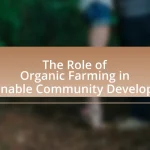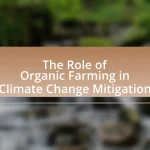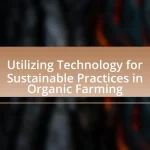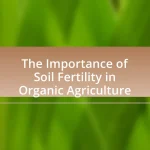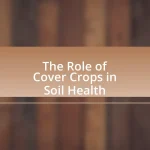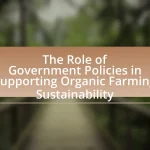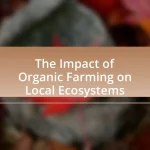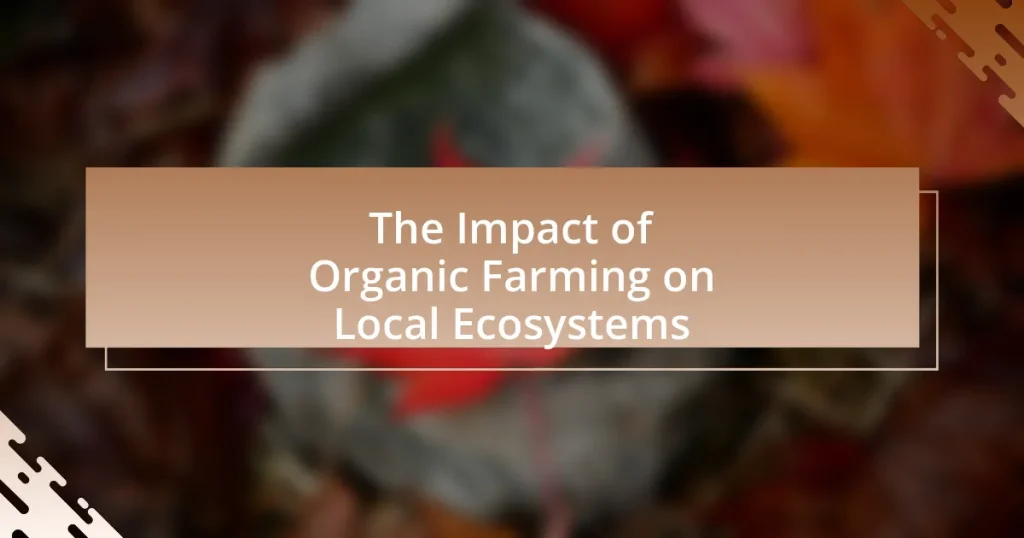The article examines the impact of organic farming on local ecosystems, highlighting its benefits such as enhanced biodiversity, improved soil health, and reduced chemical runoff. Organic farming practices, including crop rotation and the use of organic fertilizers, contribute to healthier ecosystems by supporting a greater variety of plant and animal species compared to conventional farming methods. The article also discusses the differences between organic and conventional farming, the ecological benefits of organic practices, and the challenges faced in maintaining wildlife habitats. Additionally, it emphasizes the importance of understanding these impacts for sustainable agriculture and environmental conservation.
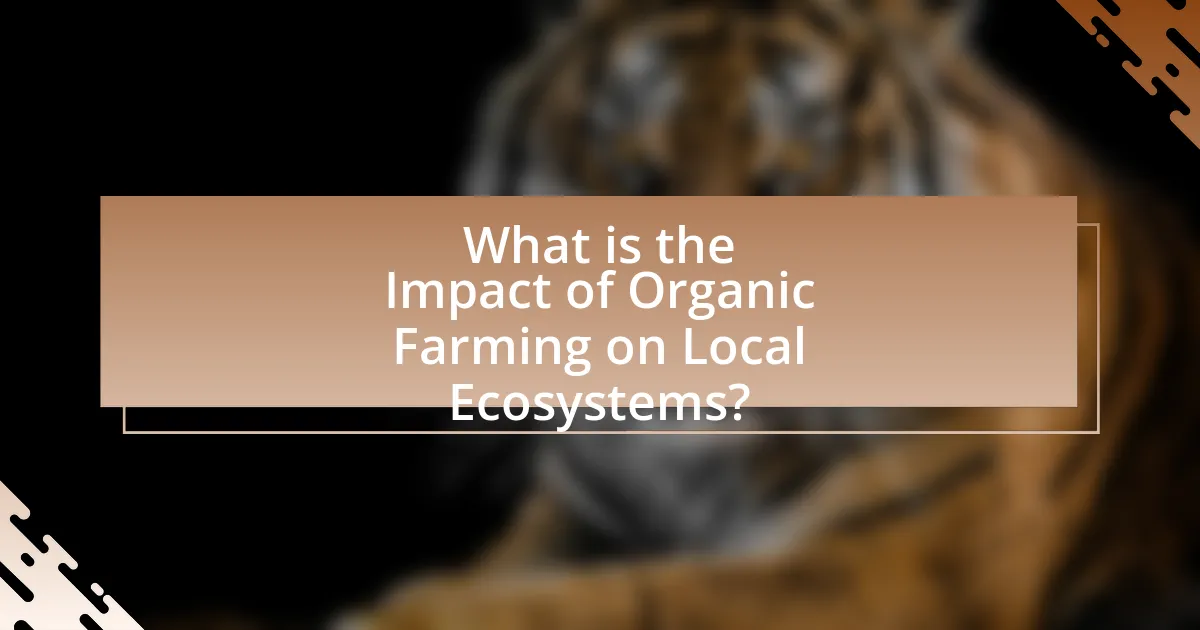
What is the Impact of Organic Farming on Local Ecosystems?
Organic farming positively impacts local ecosystems by enhancing biodiversity, improving soil health, and reducing chemical runoff. Studies show that organic farms support a greater variety of plant and animal species compared to conventional farms, as they avoid synthetic pesticides and fertilizers that can harm wildlife. For instance, research published in the journal “Agriculture, Ecosystems & Environment” indicates that organic farming practices can increase species richness by up to 30%. Additionally, organic farming promotes healthier soil through practices like crop rotation and composting, which enhance soil structure and fertility. This improved soil health contributes to better water retention and reduced erosion, further benefiting local ecosystems.
How does organic farming differ from conventional farming?
Organic farming differs from conventional farming primarily in its use of synthetic inputs; organic farming prohibits synthetic pesticides and fertilizers, while conventional farming often relies on them for crop production. Organic practices emphasize natural processes, such as crop rotation and composting, to maintain soil health and biodiversity. According to the USDA, organic farming systems enhance ecosystem services, such as soil fertility and pest control, by promoting a diverse range of organisms and minimizing chemical runoff. This approach contrasts with conventional methods, which can lead to soil degradation and reduced biodiversity due to chemical dependency.
What practices define organic farming?
Organic farming is defined by practices that prioritize ecological balance and biodiversity while avoiding synthetic chemicals. Key practices include crop rotation, which enhances soil health and reduces pest buildup; the use of organic fertilizers, such as compost and manure, to enrich soil without harmful additives; and integrated pest management, which employs natural predators and biological controls to minimize pest damage. Additionally, organic farming prohibits the use of genetically modified organisms (GMOs) and synthetic pesticides, ensuring that farming methods support sustainable ecosystems. These practices collectively contribute to healthier soil, improved water quality, and enhanced biodiversity, aligning with the principles of organic agriculture as outlined by the USDA National Organic Program.
How do these practices influence local ecosystems?
Organic farming practices positively influence local ecosystems by enhancing biodiversity and improving soil health. These practices, such as crop rotation, cover cropping, and reduced chemical inputs, promote a diverse range of plant and animal species, which contributes to ecosystem resilience. Research indicates that organic farms typically host 30% more species than conventional farms, fostering a balanced ecosystem that supports pollinators and natural pest control. Additionally, organic farming enhances soil structure and fertility through the use of organic matter, which increases water retention and reduces erosion, further benefiting local ecosystems.
Why is understanding the impact of organic farming important?
Understanding the impact of organic farming is important because it directly influences local ecosystems, biodiversity, and soil health. Organic farming practices, which avoid synthetic pesticides and fertilizers, promote a healthier environment by enhancing soil fertility and reducing chemical runoff into waterways. Research indicates that organic farming can increase biodiversity, with studies showing that organic farms support 30% more species than conventional farms, thereby contributing to ecosystem resilience. Additionally, organic farming practices improve soil structure and health, leading to better water retention and reduced erosion, which are critical for sustainable agriculture and environmental conservation.
What are the ecological benefits of organic farming?
Organic farming provides significant ecological benefits, including enhanced biodiversity, improved soil health, and reduced pollution. By avoiding synthetic pesticides and fertilizers, organic farming promotes a diverse range of plant and animal species, which contributes to ecosystem resilience. Research indicates that organic farms typically host 30% more species than conventional farms, fostering a balanced ecosystem. Additionally, organic practices such as crop rotation and cover cropping enhance soil structure and fertility, leading to better water retention and reduced erosion. A study published in the journal “Agriculture, Ecosystems & Environment” found that organic farming can increase soil organic matter by up to 25%, which is crucial for carbon sequestration and mitigating climate change. Furthermore, organic farming minimizes water contamination by reducing chemical runoff, thereby protecting aquatic ecosystems. These practices collectively contribute to healthier ecosystems and promote sustainability.
How does organic farming contribute to biodiversity?
Organic farming contributes to biodiversity by promoting a diverse range of plant and animal species through practices that enhance ecosystem health. This farming method avoids synthetic pesticides and fertilizers, which can harm non-target species and degrade habitats. Instead, organic farming employs crop rotation, cover cropping, and intercropping, which create varied habitats and food sources for wildlife. Research indicates that organic farms typically host 30% more species than conventional farms, as shown in a study published in “Nature” by Benis et al. (2017), highlighting the positive correlation between organic practices and increased biodiversity.
What challenges does organic farming face in relation to ecosystems?
Organic farming faces several challenges in relation to ecosystems, primarily including biodiversity loss, soil degradation, and pest management issues. Biodiversity can be negatively impacted due to the limited crop variety often associated with organic practices, which can reduce habitat availability for various species. Soil degradation occurs when organic farming relies heavily on tillage, which can disrupt soil structure and lead to erosion. Additionally, pest management in organic farming often depends on natural predators and organic pesticides, which may not always effectively control pest populations, potentially leading to crop losses and further ecosystem imbalance. These challenges highlight the complexities of maintaining ecological integrity while pursuing organic farming methods.
How do pests and diseases affect organic farming practices?
Pests and diseases significantly impact organic farming practices by reducing crop yields and increasing production costs. Organic farmers rely on natural pest control methods and disease-resistant plant varieties, but outbreaks can lead to substantial losses. For instance, a study published in the journal “Agriculture, Ecosystems & Environment” found that pest infestations can decrease yields by up to 50% in organic systems compared to conventional farming. Additionally, the need for organic-approved pesticides and interventions can raise operational expenses, making it challenging for farmers to maintain profitability while adhering to organic standards.
What are the limitations of organic farming in ecosystem management?
Organic farming has limitations in ecosystem management primarily due to its reliance on natural inputs, which can restrict productivity and biodiversity. For instance, organic farming often uses crop rotation and organic fertilizers, which may not provide sufficient nutrients compared to synthetic fertilizers, potentially leading to lower yields. Additionally, organic practices may limit the use of certain pest control methods, resulting in increased pest pressure and crop losses. Research indicates that organic farms can have lower biodiversity in certain contexts, as they may not support as many species as conventional farms that utilize integrated pest management strategies. Furthermore, organic farming can require more land to produce the same amount of food, which may lead to habitat loss if more land is converted for agricultural use. These factors collectively highlight the challenges organic farming faces in effectively managing ecosystems while maintaining agricultural productivity.
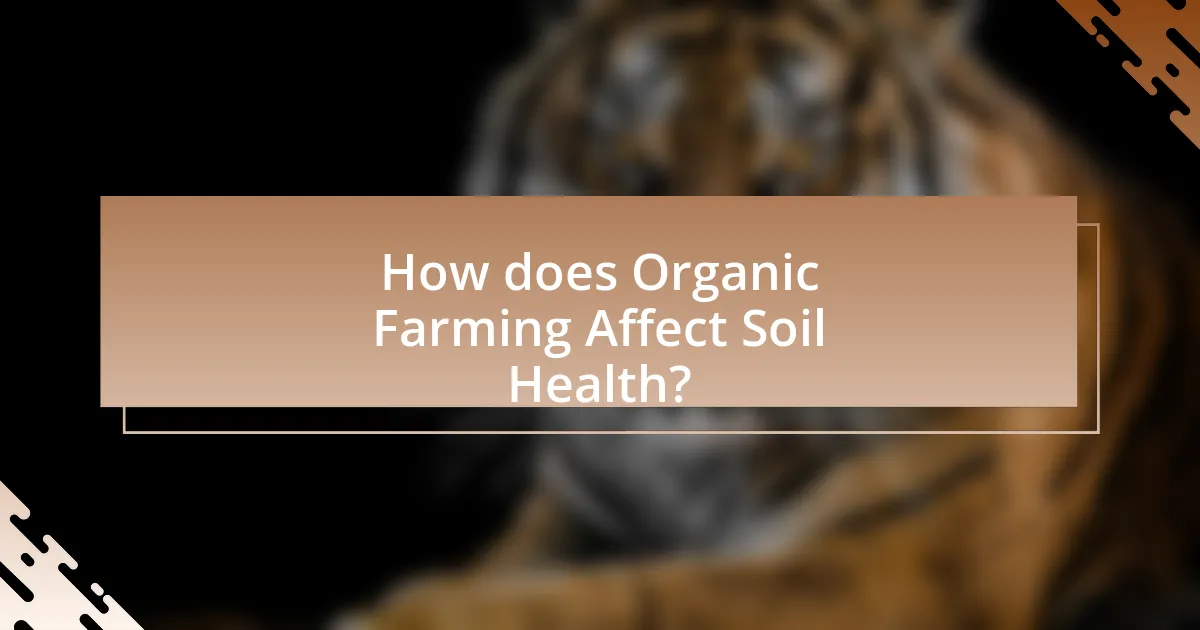
How does Organic Farming Affect Soil Health?
Organic farming positively affects soil health by enhancing its structure, fertility, and biodiversity. This farming method utilizes practices such as crop rotation, cover cropping, and organic amendments, which improve soil organic matter and microbial activity. Research indicates that organic soils typically have higher levels of organic carbon, which is crucial for nutrient retention and water infiltration. A study published in the journal “Agriculture, Ecosystems & Environment” by Reganold and Wachter (2016) found that organic farming systems can increase soil organic matter by 20-30% compared to conventional systems, leading to improved soil health and resilience.
What role does soil play in local ecosystems?
Soil serves as a fundamental component of local ecosystems by providing essential nutrients, supporting plant growth, and facilitating water retention. Healthy soil is rich in organic matter, which enhances its ability to store carbon and nutrients, thereby promoting biodiversity. According to the Food and Agriculture Organization, soil health directly influences agricultural productivity and ecosystem services, such as water filtration and habitat provision for various organisms. Thus, the quality of soil is crucial for sustaining local ecosystems and their resilience against environmental changes.
How does organic farming improve soil structure and fertility?
Organic farming improves soil structure and fertility by enhancing the biological activity and diversity within the soil ecosystem. This method emphasizes the use of organic matter, such as compost and cover crops, which increases soil organic carbon levels, leading to improved soil aggregation and aeration. Research indicates that organic farming practices can increase soil fertility by promoting nutrient cycling and reducing soil erosion. For example, a study published in the journal “Agriculture, Ecosystems & Environment” found that organic farming systems had 20-30% higher soil organic matter compared to conventional systems, which directly correlates with enhanced soil fertility and structure.
What are the long-term effects of organic farming on soil health?
Organic farming positively impacts soil health in the long term by enhancing soil structure, increasing organic matter, and promoting biodiversity. Research indicates that organic farming practices, such as crop rotation and the use of cover crops, lead to improved soil fertility and reduced erosion. A study published in the journal “Agriculture, Ecosystems & Environment” found that organic soils had 20-30% more organic carbon compared to conventional soils, which contributes to better water retention and nutrient availability. Additionally, organic farming supports a diverse microbial community, which is crucial for nutrient cycling and overall soil health.
How does organic farming influence water quality?
Organic farming positively influences water quality by reducing chemical runoff and promoting healthier soil ecosystems. This farming method avoids synthetic fertilizers and pesticides, which are major contributors to water pollution through runoff into nearby water bodies. Studies indicate that organic farming practices, such as crop rotation and cover cropping, enhance soil structure and increase its ability to retain water and nutrients, thereby minimizing erosion and nutrient leaching. Research published in the journal “Agriculture, Ecosystems & Environment” by Reganold and Wachter (2016) shows that organic farms have lower levels of nitrate in groundwater compared to conventional farms, demonstrating a clear link between organic practices and improved water quality.
What practices in organic farming help protect water resources?
Organic farming practices that help protect water resources include crop rotation, cover cropping, and the use of organic fertilizers. Crop rotation enhances soil health and reduces erosion, which in turn minimizes runoff and protects water quality. Cover cropping prevents soil erosion and improves water retention in the soil, thereby reducing the need for irrigation. The application of organic fertilizers, such as compost, reduces the risk of nutrient leaching into water bodies, which can lead to pollution. These practices collectively contribute to sustainable water management in agricultural systems.
How does organic farming reduce water pollution?
Organic farming reduces water pollution by minimizing the use of synthetic fertilizers and pesticides, which are major contributors to water contamination. In organic farming practices, natural fertilizers such as compost and manure are utilized, which release nutrients more slowly and reduce runoff into water bodies. Research indicates that organic farms have lower levels of nitrogen and phosphorus in nearby water sources compared to conventional farms, as shown in a study published in the journal “Agriculture, Ecosystems & Environment” by authors such as Reganold and Wachter. This reduction in chemical runoff leads to healthier aquatic ecosystems and improved water quality.
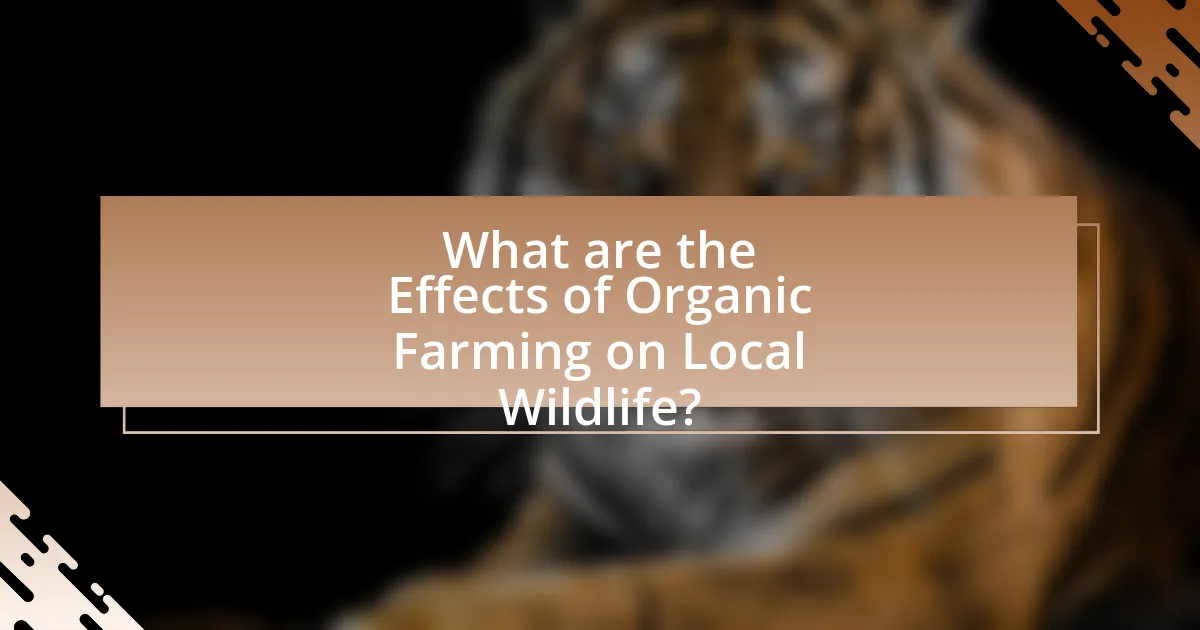
What are the Effects of Organic Farming on Local Wildlife?
Organic farming positively affects local wildlife by promoting biodiversity and enhancing habitat quality. Research indicates that organic farms typically support a greater variety of species compared to conventional farms due to the absence of synthetic pesticides and fertilizers, which can be harmful to non-target organisms. For instance, a study published in the journal “Agriculture, Ecosystems & Environment” found that organic farms had 30% more species richness in their ecosystems. Additionally, organic farming practices, such as crop rotation and cover cropping, contribute to improved soil health, which in turn supports a diverse array of organisms, including beneficial insects and soil microorganisms. These practices create a more balanced ecosystem, fostering the presence of pollinators and natural pest predators, ultimately benefiting local wildlife populations.
How does organic farming impact local fauna?
Organic farming positively impacts local fauna by promoting biodiversity and enhancing habitat quality. Research indicates that organic farming practices, such as reduced pesticide use and crop rotation, create a more favorable environment for various species. For instance, a study published in the journal “Agriculture, Ecosystems & Environment” found that organic farms support higher populations of beneficial insects, birds, and other wildlife compared to conventional farms. This increase in biodiversity is attributed to the presence of diverse crops and the absence of harmful chemicals, which together foster healthier ecosystems.
What species benefit from organic farming practices?
Organic farming practices benefit a variety of species, particularly pollinators such as bees and butterflies, as well as beneficial insects like ladybugs and predatory wasps. These species thrive in organic environments due to the absence of synthetic pesticides and fertilizers, which can be harmful to their populations. Research indicates that organic farms often have higher biodiversity, providing habitats and food sources that support these species. For instance, a study published in the journal “Agriculture, Ecosystems & Environment” found that organic farms can host up to 50% more species of pollinators compared to conventional farms, demonstrating the positive impact of organic practices on local ecosystems.
How does organic farming affect pollinator populations?
Organic farming positively affects pollinator populations by promoting biodiversity and reducing pesticide use. Research indicates that organic farms typically have higher floral diversity and provide better habitats for pollinators compared to conventional farms. A study published in the journal “Agriculture, Ecosystems & Environment” found that organic farms support 50% more species of pollinators, such as bees and butterflies, due to the presence of diverse crops and wildflowers. Additionally, the absence of synthetic pesticides in organic farming practices minimizes harmful impacts on pollinator health, further contributing to their population stability and growth.
What are the implications of organic farming for habitat preservation?
Organic farming positively impacts habitat preservation by promoting biodiversity and reducing chemical inputs that harm ecosystems. This agricultural practice often utilizes crop rotation, cover crops, and organic fertilizers, which enhance soil health and create diverse habitats for various species. Research indicates that organic farms support higher levels of biodiversity compared to conventional farms; for instance, a study published in “Agriculture, Ecosystems & Environment” found that organic farms can host up to 30% more species of plants and insects. Additionally, organic farming practices help maintain natural habitats by minimizing land conversion and preserving native vegetation, which is crucial for sustaining local wildlife populations.
How does organic farming contribute to habitat restoration?
Organic farming contributes to habitat restoration by promoting biodiversity and enhancing soil health. This agricultural practice avoids synthetic pesticides and fertilizers, which can harm local ecosystems, thereby allowing native plant and animal species to thrive. Research indicates that organic farms typically host 30% more species than conventional farms, as they provide a more diverse range of habitats and food sources. Additionally, organic farming techniques, such as crop rotation and cover cropping, improve soil structure and fertility, which supports a healthier ecosystem. These practices lead to increased microbial activity and organic matter in the soil, further benefiting local wildlife and plant communities.
What challenges do organic farms face in maintaining wildlife habitats?
Organic farms face significant challenges in maintaining wildlife habitats primarily due to habitat fragmentation and competition with conventional agricultural practices. Habitat fragmentation occurs when organic farms are surrounded by non-organic fields, which often utilize pesticides and fertilizers that can harm local wildlife. This fragmentation limits the movement of species and reduces genetic diversity, making it difficult for wildlife populations to thrive. Additionally, organic farms may struggle with maintaining diverse plant species that support various wildlife, as they often focus on specific crops for economic viability. Research indicates that organic farming can enhance biodiversity, but the surrounding agricultural landscape plays a crucial role in determining the success of wildlife habitats.
What best practices can enhance the positive impact of organic farming on ecosystems?
Implementing crop rotation is a best practice that enhances the positive impact of organic farming on ecosystems by promoting biodiversity and improving soil health. Crop rotation helps prevent soil depletion and reduces pest and disease cycles, leading to healthier ecosystems. Additionally, integrating cover crops can enhance soil structure and fertility while preventing erosion. Research indicates that organic farms utilizing these practices show increased soil organic matter and improved water retention, which supports diverse microbial communities essential for ecosystem balance. Furthermore, employing natural pest management techniques, such as introducing beneficial insects, reduces reliance on synthetic pesticides, thereby protecting non-target species and promoting ecological resilience.

